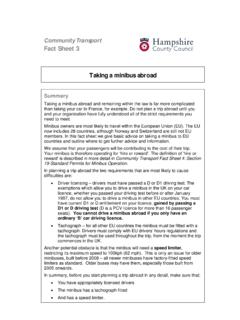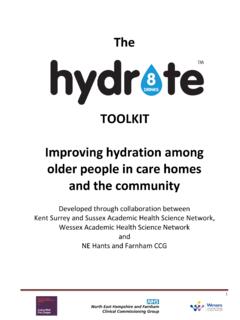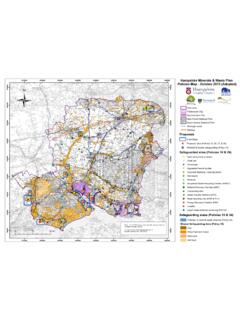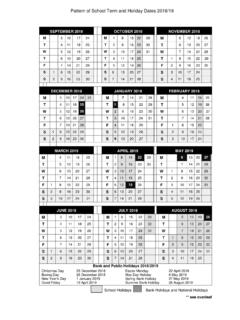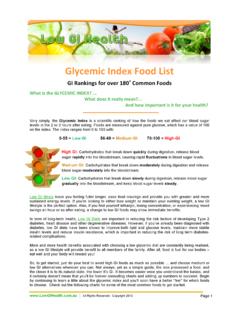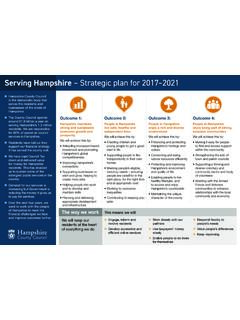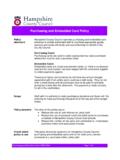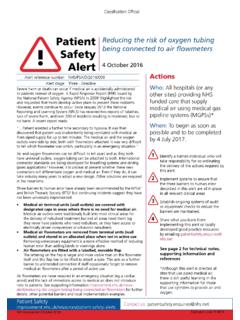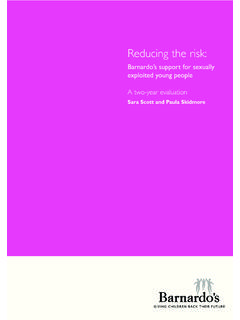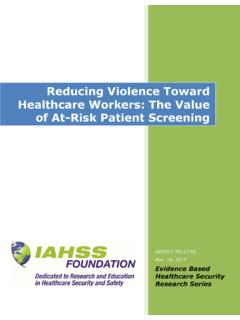Transcription of Reducing the risk of choking for people with a learning ...
1 A Multi-agency review in Hampshire Reducing the risk of choking for people with a learning disability A Multi-agency review in Hampshire Hampshire Safeguarding Adults Board Multi-agency par tnership Reducing Reducing the risk the risk offor of choking choking peoplefor with a learning disability people with a learning disability A Multi-agency review in Hampshire Contents page 3 Executive Summary 4 1 Setting the Scene: learning Disabilities and choking 7 2 National Picture of choking Incidents in people with a learning disability 10 3 What Causes people with a learning disability to Choke? 13 4 Commissioning and Monitoring Care 17 5 Assessing Risk of choking 19 6 The Mental Capacity Act and Advocacy 22 7 Developing the Individual Care Plan 25 8 Training and Health Promotion 28 9 Going in to Hospital 30 10 Reporting choking Incidents 32 11 Conclusions 33 12 Glossary of Responsibilities 34 13 Summary of Recommendations Appendices page 36 1 References 40 2 Acknowledgements 41 3 Media Items about choking Deaths 44 4 NPSA learning Disabilities dysphagia protocol for General Practitioners 46 5 Letter to Colleagues Safety Alert 48 6 Eating and Drinking Difficulties Screening Tool 49 7 Mental Capacity Act assessment for people with a learning disability at risk of choking 51 8 Training Matrix for staff and others caring for persons who may be at risk of
2 choking 52 9 Flow chart for reporting of choking incidents 53 10 Glossary of Responsibilities A Multi-agency review in Hampshire Executive Summary This report is aimed at people who are working with those who have a learning disability , in the role of commissioners or providers of services. The report has been produced on behalf of the Hampshire Safeguarding Adults Board by a multi-agency group. This group comprised of individuals with specialist knowledge from across Hampshire and included the involvement of representatives from Southampton, Portsmouth and the Isle of Wight. The Group focused on this issue following five cases of choking resulting in death, in learning disability clients reported to Hampshire County Council between 2005-2010. In this report, we have sought to understand why people with a learning disability are at greater risk of choking and to look at what we in Hampshire can do to improve outcomes for people who are at risk of choking , in any care setting.
3 A number of recommendations are made at the end of the report as a result of the findings which are all based on common sense and good practice. These recommendations cover a wide range of issues including understanding of causes of choking ; recognition of choking risk;. emergency response to someone who is choking ; training for staff;. commissioning placements and supporting people to keep healthy. Throughout the course of this work we have become aware that there is no national collection of data in relation to choking deaths and no clear understanding of the issue. The National Patient Safety Agency carried out work in this area in 2007 but this data is now five years old. The Group has therefore recommended a number of simple strategies that providers can use to identify individuals at risk of choking , ensure that they have access to dental and medical checks to keep healthy and that their staff are trained to address choking risks , both from the perspective of the rights of the individual but also in terms of a first aid response if a person does choke.
4 In addition, we have recommended that commissioners ensure that appropriate placements are found with providers who can work with individuals to manage their risk and also that sufficient speech and language therapy resource is in place in the community to meet the needs of those service users who require specialist assessment. Finally, as part of this work it has become clear that there is no national collection of information about choking in learning disability clients and yet we have discovered it is a regular cause of death amongst this group. The Group would therefore recommend that Safeguarding Adults Boards request that the Department of Health make arrangements to collect this data in order to understand the scale of the problem and seek to address it. 3. Reducing the risk of choking for people with a learning disability 1 Setting the Scene: learning Disabilities and choking people with a diagnosis of learning disability are well known to be at higher risk of choking than other people and there is much research evidence to support this, for example, Thacker (2007), Samuels (2006).
5 This is due to several factors including problems with chewing, difficulty swallowing (dysphagia), behaviours such as bolting food or pica (eating inappropriate and non-food items) and the effects of medication. These difficulties can have a significant impact on a person's health, resulting in problems such as aspiration pneumonia and frequent upper respiratory infections, undernutrition and dehydration (Harding, 2010). In the most extreme cases, a piece of food (or non-food item). can obstruct the airway and lead to death. There has been national concern regarding the care of those with a learning disability - the Death by Indifference (Mencap 2007) report describes what it calls institutionalised discrimination', which results when organisations fail to make changes in the way they deliver services to take account of people 's differing needs.
6 In addition, the Six Lives report (PHSO 2009) questioned commissioning and provision of services, stating: The findings of our investigations pose serious questions about how well equipped the NHS and councils are to plan for and provide services tailored to the needs of people with learning disabilities . Since the Six Lives report, Mencap have identified a further 74 people with a learning disability (Mencap 2012) who have died as a result of institutional discrimination. The report cites poor communication, lack of basic care and attention, and a failure of services to meet the different needs of people with learning disabilities as reasons for the high numbers of deaths. In Hampshire, it was noted that there have been five deaths between 2005-2010 resulting from a choking incident in a person with a learning disability .
7 All of these individuals were living in a supported environment and all cases had been reviewed in order to determine the learning for services. In looking at all the five cases together, it was noted that there were a number of similarities so a decision was made to bring the issue of choking in people with a learning disability to the attention of the Hampshire Safeguarding Adults Board for action. 4. A Multi-agency review in Hampshire In response, the Hampshire Safeguarding Adults Board established a multi-agency review (The Group) to review the five deaths and explore and identify areas of service that could be improved. It was recognised that the issue is pertinent to a range of stakeholders, hence the multi-agency approach. The Group which included representation from Southampton, Portsmouth and the Isle of Wight areas - met several times during 2011 and work streams were established to review particular areas of practice.
8 Membership of the Group and other people who contributed to this review in person and by correspondence can be seen at Appendix 2. 5. Reducing the risk of choking for people with a learning disability There were a number of work stream areas identified during the review which were seen to influence the successful management of risk of choking , including: L Recognition of people who may be at risk of choking L Appropriate referral to health professionals for advice and planning L Care staff training around the recognition of risk, mental capacity assessments and best interests decision making, and First Aid to be given when someone chokes L Effective commissioning and monitoring of placements for people who are at risk of choking L Consistent reporting of choking incidents including application of safeguarding processes L Information for the public.
9 The aim of the review was not to do a full literature search or undertake primary research, but rather gain a broader understanding of prevalence and causes of choking and identify any issues in practice. The Group consulted colleagues and looked at what was happening elsewhere in the UK around choking management and prevention. The review considered people in all care settings. The Group worked on the assumption that the ideal situation is where parents or regular carers have a full understanding of the person with a learning disability - their needs, wishes/choices and the risks inherent in living their lives and who take action to minimise their risk of choking . 6. A Multi-agency review in Hampshire 2 National Picture of choking Incidents in people with a learning disability The Group tried to establish national figures for premature deaths of people with learning disabilities caused by choking , but discovered that there is no national data collection, but rather several bodies collecting data.
10 National Patient Safety Agency The National Patient Safety Agency (NPSA) receive reports mainly (although not exclusively) from healthcare settings. The NPSA. received 605 reports of choking -related incidents involving adults with learning disabilities between 30 April 2004 and 30 April 2007. The majority of these incidents (58%) took place at mealtimes. Incidents occurring in residential care homes accounted for 41%, and 58% took place within inpatient and assessment services. The remainder occurred in public places. As a result, the NPSA produced a comprehensive set of tools to help staff support people with a learning disability and plan care around eating and drinking. It is not our intention to reproduce any of the NPSA work here and these resources may be found on the NPSA website: uk/resources/?



